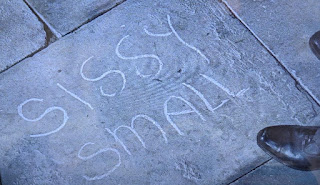It’s a cool thing when you hear about a film for the first time, a film that’s decades old and you’ve never heard of and you find you can watch it right away. This happened recently when I found a collection of John Ford films from Columbia Studios at the library. There were five films, four of which I’d at least heard of and one I’d seen. But a fifth that was completely new to me.
I learned in Leonard Maltin’s introduction the reason I’d never heard of the film. It had been made in England based on a British bestseller. Ford had read the book and wanted to make the film. But when the film was brought to the United States, the title was changed, and a good deal of footage was hacked away. Ford wasn’t pleased with Columbia’s state-side cut of the film and did nothing to help promote the film’s release. It was released as the lower half of a double bill and was soon forgotten. Until Turner Classic Movies eventually debuted the original cut of the film on their channel and released this DVD in this collection of the master director’s work.
Gideon’s Day (known in the U.K. as Gideon of Scotland Yard) is the story of a policeman, Chief Inspector George Gideon (Jack Hawkins), but I’m not interested in writing about him. Of course, he’s the person John Ford wanted to make a film about. But I’ve been writing about clergy in movies for so long, it’s Sissy Small that caught my eye.
In the film, Gideon relies on information from a criminal informant, Herbert “Birdie” Sparrow (Cyril Cusack.) When looking for Birdie, Gideon learns that his informant is working at St. Ethelbergs Church. The church had asked the police for a recommendation for a caretaker, looking for the man “who was most in need of reforming.”
A pastor at the church is the Reverend Julian Small (Jack Watling.) We see the young boys of the neighborhood mocking the minister from afar, calling him “Sissy” Small and writing that name on the pavement. He complains to Miss Courtney (Doreen Madden), Vicar’s daughter, “I’m a hopeless, pitiful failure. The children laugh at me. I hope to gain their respect but I’m just a figure of fun.”
Miss Courtney tells him he doesn’t have to put up with that. All he has to do is tell the children about his military history, that he was a commando with a daring reputation. Small refuses, saying he won’t use that blood-soaked history as a way to promote himself.
I found this interesting, because this is often a quandary for pastors. How much of your personal life should you share with your congregation? If you look at the Apostle Paul, he certainly shared his past (perhaps to the point of “oversharing” at times.) He talked about his great religious achievements as a Pharisee and his great suffering as an Apostle.
Still, one can’t help admiring Small’s refusal to use his war history as an easy fix.
Gideon comes to the church to see Birdie, who scolds the policeman for lighting up a cigarette in the church. The Vicar Courtney (Henry Longhurst) asks Gideon if he’s a friend of Birdie’s or a fan of Gothic architecture.
Toward the end of the film, bad men come to the church, looking for Birdie the Informant. Rev. Small confronts the thugs, beating up the two men with knives in hand-to-hand combat, just before two policemen arrive at the church. Small insists the police officers remove their hats in church.
The boys of the neighborhood learn of the Rev. Small’s latest exploits and he becomes their hero. As the neighborhood kids gather in the church, Small calls out, “Downstairs, boys, we’re all going to have some cake!”
This film is full of quirky characters, each given their moment to shine. But perhaps none shines brighter than the Reverend Small. (Who earns his Four Steeple Rating.)



